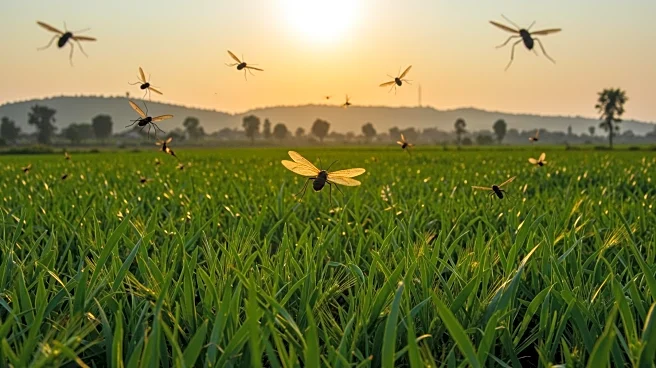What's Happening?
A recent study led by CABI has identified 9,071 pest species previously unreported in Uganda, posing potential threats to smallholder farmers and food security. The research, published in Frontiers in Agronomy, utilized the CABI Horizon Scanning Tool to assess the risks associated with these pests, including Fusarium f.sp. cubence Tropical Race 4 on bananas and the fall armyworm. Of the identified species, 360 were reported as invasive, with significant numbers of arthropods, bacteria, fungi, and viruses. The study recommends targeted surveillance, regulation, and industry management to mitigate these risks. Dr. Joseph Mulema, the lead author, emphasized the importance of this information for risk monitoring and management, which is crucial for Uganda's agricultural sector, contributing significantly to the country's GDP and employment.
Why It's Important?
The identification of these pest species is crucial for Uganda's agricultural sector, which is vital to the country's economy, contributing 24% to GDP and employing 68% of the labor force. Pest infestations can severely impact staple and cash crops, exacerbated by climate change. Effective management of these pests is essential to safeguard the livelihoods of smallholder farmers and preserve sensitive ecosystems. The study's findings provide a basis for evidence-based decision-making in trade facilitation and pest management, ensuring the sustainability and resilience of Uganda's agriculture. Strengthening pest surveillance and management strategies is necessary to confront challenges like land degradation and declining soil fertility.
What's Next?
The study suggests developing a national pest risk register to track threats and guide effective risk management. Uganda's Department of Crop Inspection and Certification plans to enhance its capacity to manage these pests sustainably across the food value chain. This includes strengthening pest surveillance, management, and prevention strategies. The Agricultural Sector Strategic Plan has prioritized key commodities for protection against pest threats. Coordinated, evidence-based actions are required to ensure the sustainability of Uganda's agricultural sector for future generations.
Beyond the Headlines
The study highlights the need for a robust risk monitoring, early detection, and rapid response system to prevent pest introductions and contain their spread. Developing strategies for risk communication and stakeholder conduct is essential to minimize the introduction of damaging pests. Addressing information gaps regarding pests in neighboring countries is crucial to avoid unnecessary phytosanitary measures. The findings underscore the importance of international collaboration in pest management and trade facilitation.









